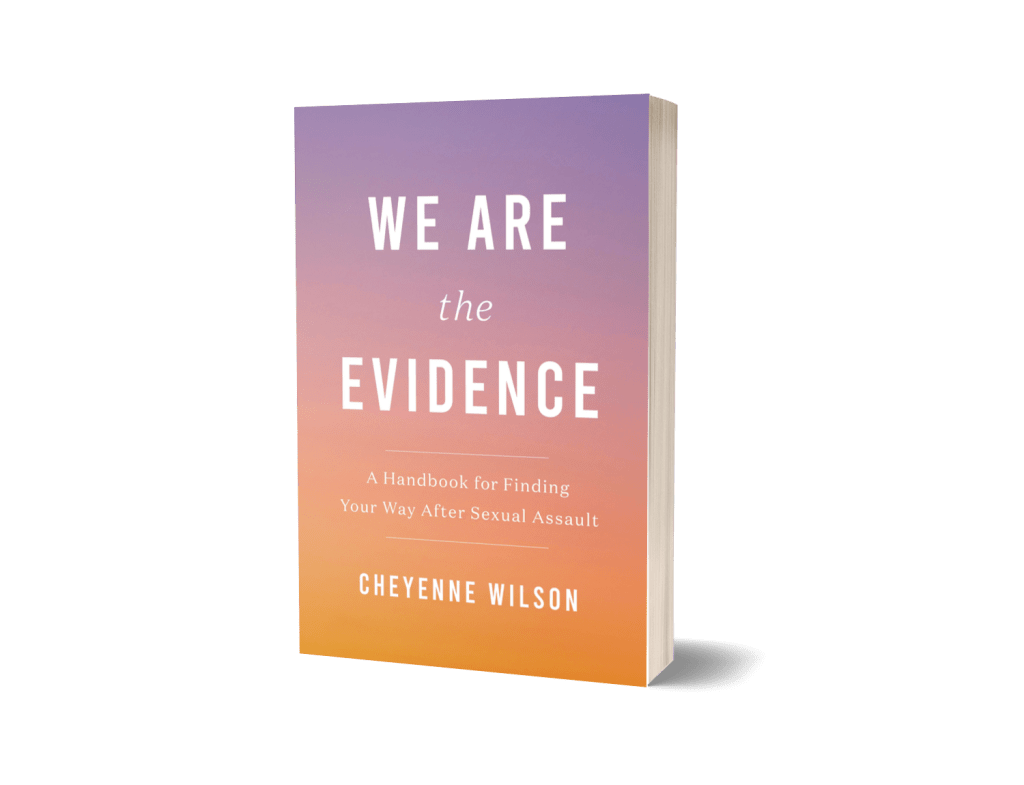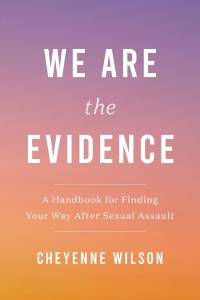WE ARE THE EVIDENCE / Table of Contents & Excerpt

Table of Contents
Foreword by Kathryn Marsh, Esq., and Melissa Hoppmeyer, Esq.
Introduction
Part I
CHAPTER 1. The Truth About Sexual Assault
Defining Sexual Assault
Let’s Talk About Consent
Expert Contribution: Alcohol-Facilitated Sexual Assault
Common Types of Manipulation
Expert Contribution: Signs of Sexual Abuse in Children and Hose to Offer Support
12 Myths About Sexual Assault
Expert Contribution: The Power of Words
Let’s Check In
CHAPTER 2. What to Do If You’ve Been Assaulted
Expert Contribution: The Role of an Advocate for Survivors of Sexual Violence
Your Next Steps
Expert Contribution: Barriers to Reporting for Black Women, and Resources for Additional Support
Hotlines
Online Resources
Local Support
Addressing Your Physical Injuries
Save Evidence and Document the Assault
Considering the Option to Report
Let’s Check In
CHAPTER 3. Additional Steps to Consider Taking Following an Assault
Medical Care and Sexual Assault Forensic Examinations
Options for Reporting and Completing the Rape Kit
Expert Contribution: Forensic Examinations and STI Testing
How to Find a Medical Provider and What to Expect During a Forensic Examination
Finding a Sense of Safety After the Assault
Expert Contribution: Underreporting of Sexual Assault in the Native American/Alaskan Native Population
–Adult
–Children
–Underreporting
–VAWA
–Resources
Keep the Conversation Going Around Reporting
Let’s Check In
CHAPTER 4. Checking In and Understanding the Aftermath of Sexual Assault
Process Your Responses to the Trauma
Expert Contribution: Ending the Stigma of the Friend Trauma Response
Finding a Trauma-Informed Therapist
Expert Contribution: Grounding and Coping Skills
Checking In and Self-Care
Let’s Check In
Part II
CHAPTER 5. Deciding Who to Tell and What to Tell Them
Why Disclosure Can Be Challenging
Expert Contribution: Disclosing Sexual Assault
How to Respond When Someone Discloses Sexual Assault
Let’s Check In
CHAPTER 6. Your Support Team
Choosing Your Physical Health Support Team
Expert Contribution: Q & A with a Dietitian
Choosing Your Mental Health Support Team
Let’s Check In
CHAPTER 7. Seeking Justice
Is Reporting an Option for Me?
Expert Contribution: Delayed Reporting
Deciding to Report
False Reports: Rare but Damaging
Expert Contribution: Victim Advocates and Reporting to Law Enforcement
Expert Contribution: Title IX: A Deep Dive
Options Besides Criminal Court
Let’s Check In
Part III
CHAPTER 8. The Investigation
Expert Contribution: The Interview and Investigation
Taking Care of Yourself During an Investigation
Prosecuting the Crime
Expert Contribution: Taking the Case to Trial
Let’s Check In
CHAPTER 9. The Criminal Trial and Testifying
Leading Up to a Criminal Trial
Expert Contribution: Courtroom Defenses and Rape Myths
Jury Trial: What to Expect
The Stages of the Jury Trial
Testifying
Expert Contribution: Preparing to Testify and Plea Bargains
Expert Contribution: Advice from the Prosecution
Expert Contribution: Stages of the Civil Justice System
Let’s Check In
CHAPTER 10. The Verdict and Sentencing
The Verdict
Expert Contribution: Understanding the Scope of Emotions of the Verdict
The Sentencing
Expert Contribution: Writing a Victim Impact Statement
Let’s Check In
Part IV
CHAPTER 11. The Healing Journey
Body and Brain: What You Might Experience Post Assault
Minding Your Mind
Expert Contribution: Mental Health and Sexual Assault
Brief Definitions of Psychological Disorders Associated with Sexual Assault
Mending Your Body
Therapies and Practices for Healing
Mindfulness and Affirmations
Nurturing Your Body
Expert Contribution: Benefits of Finding a Fitness Community
Other Ways to Find Healing
Expert Contribution: Pets and Trauma
Working on Our Relationships
Expert Contribution: Consent in Relationships
Let’s Check In
CHAPTER 12. From Surviving to Thriving
Finding Your Why
Expert Contribution: The Future Is Bright
Being an Ally
Reclaiming Who You Were and Choosing Who You Will Be
Let’s Check In
EPILOGUE: A Note from the Author
More Support from the Experts
Contributor Biographies
Acknowledgments
Notes
Index
About the Author
Introduction
I never thought I’d be sexually assaulted, and due to the limited information I had about the realities of sexual assault and commonly held myths, I figured that as long as I avoided the situations and places where rapists were known to lurk, I’d be safe. So, I did the “right” things. I avoided drinking around strangers, wore conservative clothes, and steered clear of dark alleys. When a friendly college classmate invited me over to watch a movie, the idea that I might be harmed didn’t even occur to me. At that time, I had no idea that rapists could be friendly classmates who were also obsessed with Disney. But guess what? Sometimes they are.
After I was assaulted, I tried to find information and other resources that would help me to make sense of the confusion I felt and all the questions I had. It was alarming to see how few resources there were, and unbelievable that there wasn’t a single comprehensive book that covered what to do after an assault, how to disclose the trauma, how to decide whether to report the crime or seek an alternative form of justice, or how to begin the healing journey.
After two years of confusion, anxiety, and unanswered questions, I stumbled upon an online document for law students about “rape myths.” I’d never heard of a rape myth. The document said that more than 80 percent of sexual assaults are committed by people the victims know.
By the time I finished reading that paper, I was angry. Why hadn’t I heard the truth about these myths before? Why wasn’t there anything like this in the college library when I was searching for answers? If one in six women and one in thirty-three men are likely to be sexually assaulted in their lifetime, why isn’t the truth about rape myths being widely publicized? As angry as I was, though, I also felt validated. Finally, I was learning something useful that could help me to move forward with truth and greater clarity. Armed with solid information, I felt empowered to report my sexual assault, face the trial process, and reach out for help to start my healing journey. That’s when I realized how powerful information can be for survivors, and that’s when I knew I had to write this book. I want to use my trauma, this dark piece of my life story, to light the way for the many others who have been, and will be, victims of sexual violence.
The survivor community is so incredibly beautiful in how we work together to advocate and create resources. I’d had the vision and desire to write this book for years, but I couldn’t have done it without the support I’ve received from others who have experienced this trauma. The emails, Instagram posts, and messages from brave people from around the world kept me going during the times when it would have been a lot easier to give up. The survivors who participated in interviews for this book continually inspired me and reminded me how much everyone in this community wants to help one another.
The number of people experiencing sexual assault grows every hour, and those of us who are already in that group are quick to welcome the new members to a community that none of us want to belong to. We want to take the darkest part of our history and make a positive difference with it. From my own journey and connecting with thousands of other survivors, I’m convinced that knowledge empowers people, and I hope that this accessible and practical handbook will empower more survivors to share their stories, make informed decisions about reporting their assaults, and embark on their healing journeys. I also hope this book encourages people who are not sexual assault survivors to join their voices with ours to advocate for change. The more informed our society is about the realities of sexual assault, the more power we’ll have to address this public health crisis. The more power we have, the better we’ll be able to make effective changes in our laws, our justice and health care systems, and in the safety and quality of our own lives.
This book was written from one survivor to another. While I’m not a lawyer, doctor, therapist, or law enforcement agent, experts from those fields and others have graciously contributed to this book to provide you with information on topics that are not my areas of experience or expertise. But even with the expert contributions, this book cannot act as a substitute for professional support, treatment, or legal advice. My hope is that you’re able to use this information to advocate for yourself and create a plan to move forward. Language has a large impact. Throughout this book, you will see the terms “survivor,” “victim,” “victim survivor,” and “person who was sexually assaulted” used. Everyone will best identify or have different perceptions of each term. Feel free to replace the terms with the words you prefer. This is an individual journey that we’re on together, so as you read the suggestions that the experts and other survivors share, you get to decide what you want to include in your journey and how you want to include it.
We Are the Evidence is the first comprehensive resource for survivors of sexual assault. Written with conviction and compassion by Cheyenne Wilson, a registered nurse and survivor of sexual assault, this handbook contains everything victims and advocates need to know to navigate the tumultuous times that follow an assault. Within, there's advice for:
- The appropriate steps to take immediately after an assault
- Disclosing your assault how and when you choose
- How to pursue justice and navigate the legal system
- Beginning the healing process and reclaiming your power
Throughout, you'll find exercises, opportunities to rest, and invaluable guidance from experts like attorneys, detectives and therapists. Voices from other sexual assault survivors also lend their support.
Meant to be easily accessible, everything is organized for you to go right to the topic you most need guidance for, no matter where you are on your healing journey. You deserve to be heard, believed, and supported.
